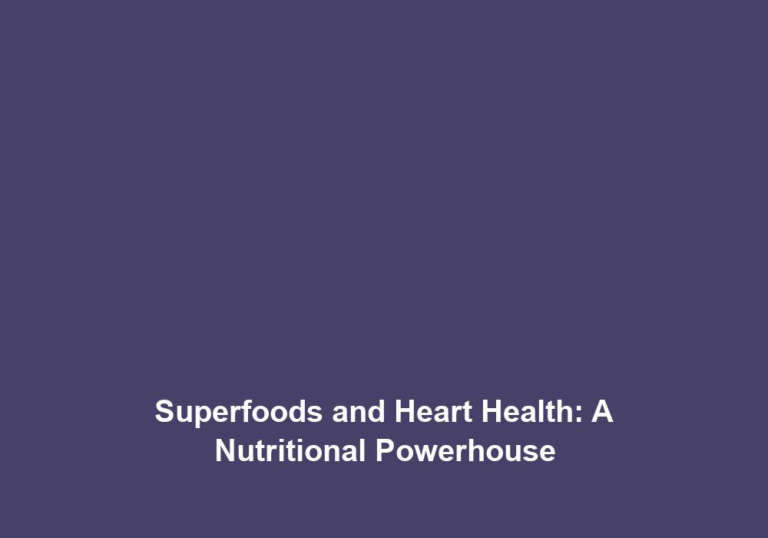Heart’s Best Friend: Turmeric’s Bounty of Health Benefits
Turmeric, the vibrant yellow spice commonly found in Indian cuisine, has gained significant attention in recent years for its numerous health benefits. Beyond adding flavor and color to culinary dishes, turmeric is renowned for its potential to promote heart health and overall well-being. This article will delve into the bountiful health benefits of turmeric, exploring its impact on the cardiovascular system and other aspects of our health.
The Power of Curcumin
Turmeric owes its health-promoting properties to its active compound called curcumin. Curcumin is a potent antioxidant and anti-inflammatory agent that has been extensively studied for its potential to support heart health. Its unique molecular structure enables it to neutralize harmful free radicals and reduce chronic inflammation, both of which are implicated in various cardiovascular conditions.
Curcumin’s antioxidant properties are particularly beneficial for heart health. It helps neutralize free radicals, unstable molecules that can cause damage to cells and contribute to the development of heart disease. By reducing oxidative stress, curcumin may help prevent the progression of heart disease and promote overall cardiovascular well-being.
In addition to its antioxidant effects, curcumin also exerts powerful anti-inflammatory effects. Chronic inflammation is a key contributor to the development of various diseases, including heart disease. By inhibiting the production of inflammatory molecules, curcumin helps to reduce inflammation within the blood vessels, promoting better cardiovascular health. It also helps prevent the accumulation of plaque in the arteries, which can lead to atherosclerosis and increase the risk of heart attacks and strokes.
1. Heart Disease Prevention
Heart disease, including conditions like heart attacks and strokes, remains one of the leading causes of death worldwide. Fortunately, research suggests that incorporating turmeric into our diet may help prevent the onset of these life-threatening conditions. Curcumin has been shown to improve several factors associated with heart disease, such as reducing cholesterol levels, decreasing blood pressure, and preventing the formation of blood clots.
High cholesterol is a major risk factor for heart disease, as it contributes to the buildup of plaque in the arteries. Curcumin has been found to lower levels of LDL cholesterol, also known as “bad” cholesterol, while increasing levels of HDL cholesterol, or “good” cholesterol. This beneficial effect on cholesterol levels helps reduce the risk of heart disease.
Curcumin also helps regulate blood pressure, another significant risk factor for heart disease. High blood pressure can strain the heart and increase the risk of cardiovascular events. Studies have shown that curcumin can help lower blood pressure by promoting the dilation of blood vessels and improving endothelial function. By maintaining healthy blood pressure levels, curcumin supports optimal heart health.
Furthermore, curcumin has anticoagulant properties, which means it helps prevent the formation of blood clots. Blood clots can block the arteries and lead to heart attacks or strokes. By inhibiting the aggregation of platelets, curcumin reduces the risk of harmful blood clot formation and improves blood flow.
2. Anti-Inflammatory Effects
Chronic inflammation is a key contributor to the development of various diseases, including heart disease. Curcumin’s powerful anti-inflammatory properties can help combat this underlying issue. By inhibiting the production of inflammatory molecules, curcumin helps to reduce inflammation within the blood vessels, promoting better cardiovascular health.
Inflammation plays a crucial role in the development and progression of atherosclerosis, a condition characterized by the buildup of plaque in the arteries. Curcumin has been shown to inhibit the activation of inflammatory pathways involved in atherosclerosis, thereby preventing the accumulation of plaque and reducing the risk of heart attacks and strokes.
Moreover, curcumin helps modulate the immune response, preventing excessive inflammation that can damage the heart and blood vessels. By reducing chronic inflammation, curcumin contributes to better heart health and lowers the risk of cardiovascular diseases.
Turmeric and Cardiovascular Health
Turmeric’s impact on heart health extends beyond its anti-inflammatory and antioxidant properties. Numerous studies have highlighted its ability to positively influence various aspects of the cardiovascular system.
1. Improved Blood Flow
Curcumin has been found to enhance endothelial function, which refers to the health and flexibility of the cells lining the blood vessels. By improving endothelial function, turmeric supports optimal blood flow throughout the body, reducing the risk of heart-related complications.
Healthy endothelial function is crucial for maintaining proper blood vessel tone and flexibility. Dysfunction in the endothelium can lead to reduced blood flow and impaired vascular health. Curcumin helps improve endothelial function by promoting the production of nitric oxide, a molecule that relaxes and dilates blood vessels. This enhanced blood flow contributes to a healthier cardiovascular system and reduces the risk of conditions like hypertension and atherosclerosis.
2. Regulation of Blood Pressure
High blood pressure, or hypertension, is a significant risk factor for heart disease. Consuming turmeric regularly may help regulate blood pressure levels, thereby reducing the strain on the heart. Curcumin’s ability to relax blood vessels and improve endothelial function contributes to maintaining healthy blood pressure.
Hypertension is often caused by the constriction of blood vessels and increased resistance to blood flow. Curcumin helps lower blood pressure by promoting the relaxation of blood vessels, allowing blood to flow more freely. It also improves endothelial function by reducing oxidative stress and inflammation, further supporting healthy blood pressure levels.
3. Prevention of Atherosclerosis
Atherosclerosis is a condition characterized by the buildup of plaque in the arteries, which can restrict blood flow and increase the risk of heart attacks and strokes. Curcumin has shown promise in preventing and even reversing this process by reducing the accumulation of plaque and inhibiting the progression of atherosclerosis.
The development of atherosclerosis is closely linked to chronic inflammation and oxidative stress. Curcumin’s anti-inflammatory and antioxidant properties help counteract these processes, preventing the formation and progression of plaque in the arteries. It inhibits the production of inflammatory molecules that contribute to the development of atherosclerosis and reduces oxidative stress, which damages the arterial walls.
Furthermore, curcumin promotes the removal of cholesterol from the arteries, preventing its accumulation and the formation of plaque. It also inhibits the migration and proliferation of smooth muscle cells in the arterial walls, which are key events in atherosclerosis progression. By targeting these mechanisms, curcumin helps maintain clear and healthy arteries, reducing the risk of cardiovascular diseases.
Additional Health Benefits of Turmeric
While the focus of this article is on turmeric’s impact on heart health, it’s worth noting that this versatile spice offers a myriad of other health benefits.
1. Anti-Cancer Properties
Curcumin’s potent antioxidant and anti-inflammatory properties make it a potential ally in the fight against cancer. Numerous studies have shown that curcumin can inhibit the growth of cancer cells, reduce tumor size, and even enhance the effectiveness of conventional cancer treatments.
Cancer development is often driven by oxidative stress, inflammation, and the uncontrolled growth of abnormal cells. Curcumin’s antioxidant effects help neutralize free radicals and reduce oxidative stress, thereby preventing DNA damage and mutations that can lead to cancer. It also inhibits the activation of inflammatory pathways that promote tumor growth and metastasis.
Furthermore, curcumin has been found to induce apoptosis, or programmed cell death, in cancer cells. This selective toxicity towards cancer cells makes curcumin a promising adjunct therapy to conventional cancer treatments, enhancing their effectiveness and reducing side effects.
2. Brain Health
Curcumin’s ability to cross the blood-brain barrier allows it to exert beneficial effects on brain health. Research suggests that curcumin may help protect against neurodegenerative diseases like Alzheimer’s and Parkinson’s by reducing inflammation, clearing amyloid plaques, and enhancing cognitive function.
Neurodegenerative diseases are characterized by the accumulation of abnormal proteins, inflammation, and oxidative damage in the brain. Curcumin’s anti-inflammatory and antioxidant properties help counteract these processes, reducing neuronal damage and promoting brain health.
Studies have shown that curcumin can inhibit the formation and aggregation of amyloid plaques, which are toxic protein clumps commonly found in the brains of Alzheimer’s patients. By preventing the buildup of these plaques, curcumin may help slow down the progression of Alzheimer’s disease and preserve cognitive function.
Curcumin also enhances the production of brain-derived neurotrophic factor (BDNF), a protein that promotes the growth and survival of neurons. Low levels of BDNF are associated with neurodegenerative diseases and cognitive decline. By increasing BDNF levels, curcumin supports the maintenance of healthy brain function and may help prevent age-related cognitive decline.
3. Digestive Health
Turmeric has long been used in traditional medicine to aid digestion. Curcumin stimulates the production of bile, which helps break down fats and enhances digestion. It may also alleviate symptoms of digestive disorders like irritable bowel syndrome (IBS) and ulcerative colitis.
Bile plays a crucial role in the digestion and absorption of fats. Curcumin stimulates the release of bile from the gallbladder, aiding in the breakdown of dietary fats and enhancing nutrient absorption. This can help alleviate symptoms of indigestion, bloating, and discomfort.
In addition, curcumin has been found to possess anti-inflammatory effects in the digestive system. Inflammatory bowel diseases like ulcerative colitis and Crohn’s disease are characterized by chronic inflammation in the gut. Curcumin’s anti-inflammatory properties help reduce inflammation in the digestive tract, providing relief from symptoms and supporting overall digestive health.
Incorporating Turmeric into Your Diet
To reap the full benefits of turmeric, it’s essential to incorporate it into your daily diet. Here are some simple ways to add this golden spice to your meals:
- Sprinkle turmeric powder onto roasted vegetables or stir it into soups and stews.
- Make a flavorful turmeric tea by steeping fresh or powdered turmeric in hot water.
- Blend turmeric into smoothies or add it to your favorite curry recipes.
- Consider taking curcumin supplements if you struggle to consume enough turmeric through food alone.
By incorporating turmeric into your diet in creative and delicious ways, you can harness its bountiful health benefits and pave the way towards a healthier, more vibrant life.
Note: This response was generated by an AI language model. While it strives to provide accurate and up-to-date information, it is always advisable to consult with a healthcare professional or nutritionist for specific dietary and health concerns.







